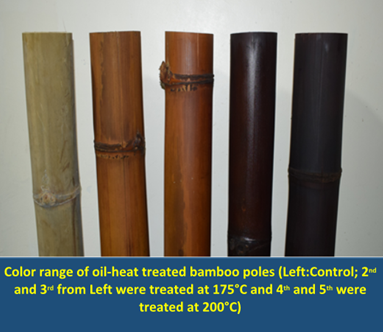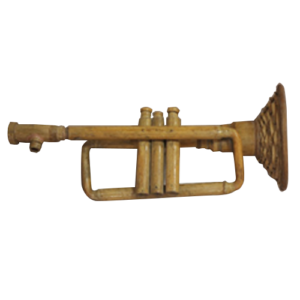Oil
This thermal modification process uses oil a treatment medium where immersion of air-dried or kiln dried bamboo poles are performed. Poles are exposed in hot oil at a desired temperature level (usually above 160°C). Depending on the target exposure time, duration of treatment starts when the oil reached desired temperature (±5°C). Thermally modified poles are removed from the oil bath once the temperature is below 50°C. TM bamboo poles are conditioned for a week or so before utilizing as a material to assemble BMIs.
Physically, thermal modification produces poles with a darker color. While altering its acoustic properties, chemical changes in the bamboo due to hot oil treatment makes it less capable to absorb moisture, less susceptible to biological attacks, with a slightly weakened strength properties (depending on the severity of temperature exposure).
Both TM in steam and oil can change the color of the bamboo poles as shown in the photo.

Science in a creative industry.
The DOST-FPRDI has a Bamboo Musical Instruments Innovation R&D program aimed at improving the quality of locally-made bamboo musical instruments (BMIs) through science and innovative technologies. The program seeks to standardize the production of selected BMIs, develop prototype designs, analyze raw material sources and existing markets, and build a BMI processing facility. In addition, the program aims to document the ethnocultural story behind several BMIs and identify the bamboo species used in BMI production to promote public awareness and appreciation of the cultural importance of these musical instruments. The program is a collaboration with the University of the Philippines and Philippine Normal University for teaching modules and analyzing sound quality and standardization of BMI design. The DOST Grants-in-Aid program provides funding.
PhBMI

